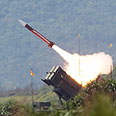
The United States has reached a deal to sell $3.48 billion worth of missiles and related technology to the United Arab Emirates, a close Mideast ally, as part of a massive buildup of defense technology among friendly Mideast nations near Iran.
Pentagon spokesman George Little announced the Christmas Day sale on Friday night. He said the US and UAE have a strong defense relationship and are both interested in "a secure and stable" Persian Gulf region.
Related atricles
- UAE PM: If Iran attacks Israel it will be gone the next day
US, Saudi Arabia ink F-15 fighter jet deal
Iran denies testing long-range missiles
The deal includes 96 missiles, along with supporting technology and training support that Little says will bolster the nation's missile defense capacity.
The deal includes a contract with Lockheed Martin to produce the highly sophisticated Terminal High Altitude Area Defense, or THAAD, weapon system for the UAE.
Tom McGrath, vice president and program manager for Lockheed Martin's THAAD program in Dallas, said in a statement it was the first foreign military sale of the THAAD system.
THAAD interceptors are produced at Lockheed Martin's Pike County Facility in Troy, Alabama. The launchers and fire control units are produced at the company's Camden, Ark., facility.
Building up allies' defense
Wary of Iran, the US has been building up missile defenses of its allies, including a $1.7 billion deal to upgrade Saudi Arabia's Patriot missiles and the sale of 209 Patriot missiles to Kuwait, valued at about $900 million.
On Thursday, the Obama administration announced the sale of $30 billion worth of F-15SA fighter jets to Saudi Arabia.
Under the fighter jet agreement, the US will send Saudi Arabia 84 new fighter jets and upgrades for 70 more. Production of the aircraft, which will be manufactured by Boeing Co., will support 50,000 jobs and have a $3.5 billion annual economic impact in the US.
All the sales are part of a larger US effort to realign its defense policies in the Persian Gulf to keep Iran in check.
The announcement came as US officials weighed a fresh threat from Tehran, which warned this week it could disrupt traffic through the Strait of Hormuz, a vital Persian Gulf oil transport route, if Washington levies new sanctions targeting Iran's crude exports.
- Receive Ynetnews updates
directly to your desktop















